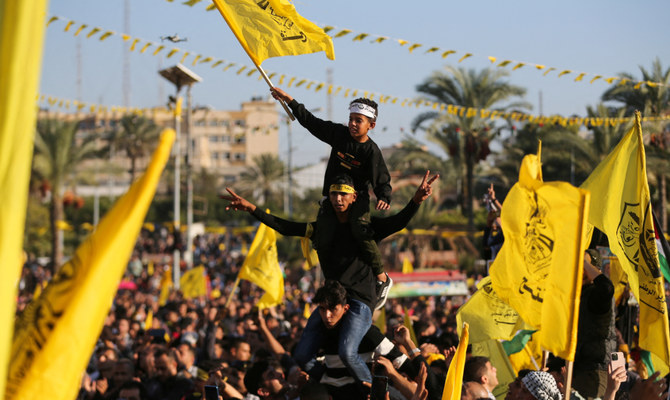RAMALLAH: The Palestinian leadership is focusing on increased diplomatic efforts to limit the actions of Israel’s radical right-wing government whose agenda includes further weakening the Palestinian Authority.
Palestinian sources said that Hady Amr, US deputy assistant secretary for Israeli-Palestinian affairs at the US Department of State, will arrive in Ramallah on Monday to meet Palestinian officials. He may meet President Mahmoud Abbas.
The president also received a call on Friday from key EU official Josep Borrell during which the latter assured him of the EU’s support for the two-state solution.
Abbas will chair a meeting of the PLO Executive Committee on Tuesday to discuss Benjamin Netanyahu's new assignment to form a new government in Israel with the participation of Israeli extremist right-wing parties.
The meeting will also discuss and develop mechanisms to implement the decisions of the Palestine Liberation Organization’s National and Central councils to stop all relations with the Israeli occupying state.
Senior Palestinian officials and Fatah leaders who spoke to Arab News confirmed that the current threat posed by the new right-wing extremist Israeli government against the PA is unprecedented.
They said the PA must adopt effective policies to counter what they saw as an “existential threat.”
Ahmed Majdalani, the PA’s minister of social development, told Arab News that the incoming Israeli government represented a severe threat to regional security and stability and the two-state solution.
He voiced concerns over a government in which Bezalel Smotrich could take over the ministry of defense or finance and Itamar Ben-Gvir the ministry of internal security.
These ministries directly impact Palestinians and will thus impact Palestinian-Israeli relations, Majdalani told Arab News.
He indicated that there would be fresh efforts to intensify political and diplomatic action to isolate the new Israeli regime.
“We will also strengthen our movement in the UN,” he said.
Majdalani said that the Palestinian government was currently evaluating the tangible steps it would take in light of the right-wing government, which is expected to seek to gradually annex Palestinian territories and perpetuate the division of Al-Aqsa Mosque.
He added: “We are concerned, and we are studying and discussing the matter seriously.
“The matter worries us, as it worries the neighboring countries that have diplomatic relations with Israel. It is embarrassing to the countries that have recently established normalization relations with Israel.”
The PA suffered several setbacks during Likud party leader Benjamin Netanyahu’s term in office.
He froze the money collected by Israel on its behalf, expanded settlements in the West Bank and East Jerusalem, ended support for the two-state solution, enhanced the division between the West Bank and Gaza Strip and refused to resume political talks with the PA.
Minister Ibrahim Melhem, spokesperson for the Palestinian government, told Arab News that the obstruction of the political horizon and the rise of the Israeli extremist right have shown the Palestinian leadership the urgency of strengthening the international presence of the PA.
Officials of the Palestinian government and the office of the Palestinian president confirmed their concern over the policies of the upcoming Israeli government and the measures it might take to undermine what remains of the PA and its security services.
Ahmed Ghuneim, a prominent Fatah leader in Jerusalem, told Arab News that the PA must expose, at the international level, the practices of the extreme right-wing Israeli government against the Palestinians.
He said the PA should call on the Arab countries that have normalized their relations with Israel in recent years to retract those decisions and to prioritize forming a national government that restores unity between the West Bank and the Gaza Strip.
In their remarks to Arab News, high-ranking officials acknowledged that any measures the PA might take to stand in the way of the extremist right-wing Israeli government’s policies may not achieve the hoped-for success. It would be easy, they said, for Israel to thwart said measures, as the PA does not have control over the land.
Nasser Al-Kidwa, the former representative of Palestine at the UN, told Arab News that it was necessary to make changes within the current Palestinian leadership that would enable it to counter the policies of the upcoming Israeli government.
Al-Kidwa indicated that the current leadership might not have the ability to confront the danger threatening Palestinians.
Despite the recent developments, the PA is continuing its diplomatic efforts at the UN. The UN’s Special Committee on Decolonization adopted a draft resolution on Friday, in which the PA requested an advisory opinion from the International Court of Justice on Israel’s prolonged occupation.
The PA welcomed the unanimous vote of the UN General Assembly’s committee on Friday.
“The vote signals to all concerned that the Palestinian issue is still on the international community’s agenda and that Israel should not go far in its racist policies against the Palestinian people,” Melhem told Arab News.
The resolution approved at UN headquarters in New York asks that the ICJ “urgently” weigh in on Israel’s “prolonged occupation, settlement and annexation of the Palestinian territory,” which it says are violating Palestinians’ right to self-determination.



























